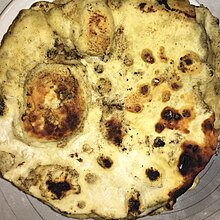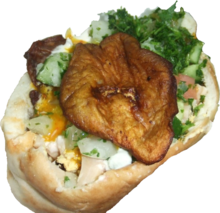Laffa
 Laffa, grilled over coals. | |
| Alternative names | Lafa, lapha, Iraqi pita |
|---|---|
| Type | Flatbread |
| Place of origin | Israel |
| Created by | Iraqi Jews[1][2] |
| Main ingredients | Flour, water, yeast, olive oil, kosher salt |
Laffa, also known as lafa, is a popular Israeli flatbread of Iraqi Jewish origin that is most often used to wrap sandwiches such as falafel and shawarma, to dip in hummus, matbucha and other dips, or with shakshouka, and other dishes. It is also the traditional bread used in sabich, an Israeli eggplant sandwich.[3][1]
History

Origins
Laffa originated within the Jewish community of Iraq, as a bread baked in their communal outdoor wood or coal-fired ovens, and among whom it was their traditional bread and served as an accompaniment to a myriad of dishes, and who existed in Iraq for thousands of years since the time of the Babylonian exile until a series of Nazi-affiliated pogroms, discrimination, and later forced expulsion from the country forced the Iraqi Jews to seek refuge in Israel during the mid-20th century. With the community's arrival in Israel en masse, they brought with them their culinary traditions including laffa, t'bit, and what would later become sabich.[3][1]
1948–present

With the arrival of Jewish refugees from Iraq and around the world to the newly-established state of Israel, various foods from the different ethnicities of the Jewish diaspora residing in the country began to become part of a unique fusion cuisine, that would later become Israeli cuisine. Over the years the use of laffa spread to other groups in Israel, and its popularity became widespread outside the Iraqi Jewish community for the first time. Laffa has since become a popular bread among almost all ethnicities in Israel, and is commonly used for various sandwiches and dips.[3][1]
Overview

Laffa is typically a large, thin flatbread with a soft, pillowy texture, that is thinner than a pita, but thicker than a lavash, or Druze mountain bread. Unlike Israeli and other pitas, laffa does not form a pocket; and sandwich fillings are wrapped in a laffa (similar to a tortilla), instead of being stuffed in a pocket as with a pita.[3][1]
Preparation

Laffa is prepared by creating a dough typically made up of flour, water, yeast, salt, sugar, and olive oil. The dough is kneaded and then often left to rise for several hours or overnight. It is then divided into several balls of dough, which are then left to rise. Traditionally a wood- or coal-fired oven is prepared, similar to a tandoor; in modern times a pizza oven, outdoor grill, stovetop, frying pan, or oven is more often used. The dough is then rolled out into a large, thin piece, much thinner than an Israeli pita (which is much thicker), and placed in a hot oven, pan, or grill and baked for several minutes until it has risen slightly and cooked through.[3][1]
Uses

Laffa is a very popular bread in Israel, where it is frequently paired with dips such as chummus and other mezzes. It is the traditional bread used in sabich, and is also commonly used to wrap sandwiches in such as schnitzel, falafel, turkey, chicken, or lamb schwarma, and others.[3][1]
Popularity in the United States

Laffa is commonly served across the United States at restaurants serving Israeli cuisine[4][5]; laffa is most notably served in the United States at the Israeli restaurant Zahav by chef Michael Solomonov in Philadelphia, where it is paired with his hummus tehina.[6][7]
See also
- Falafel
- Israeli pita
- Sabich
- Taboon bread
- Saj bread (also known as yufka)
- Markook shrek
References
- ^ a b c d e f g Marks, Rabbi Gil. The Encyclopedia of Jewish Food.
- ^ Solomonov, Michael. Israeli Soul. HMH.
- ^ a b c d e f Solomonov, Michael. Zahav: A World of Israeli Cooking. HMH.
- ^ "Lamalo Brings Israeli Style Laffa, Arak Cocktails to NoMad". Michelin Guide. Retrieved 3 October 2019.
- ^ "Opening: Middle Eastern Restaurant Lamalo". GrubStreet. Retrieved 3 October 2019.
- ^ "Cooking With Michael Solomonov: Hummus Laffa Bread". Youtube. Retrieved 3 October 2019.
- ^ "Michael Solomonov Shares Israeli Recipes and Recollections in 'Zahav'". The Forward. Retrieved 3 October 2019.
